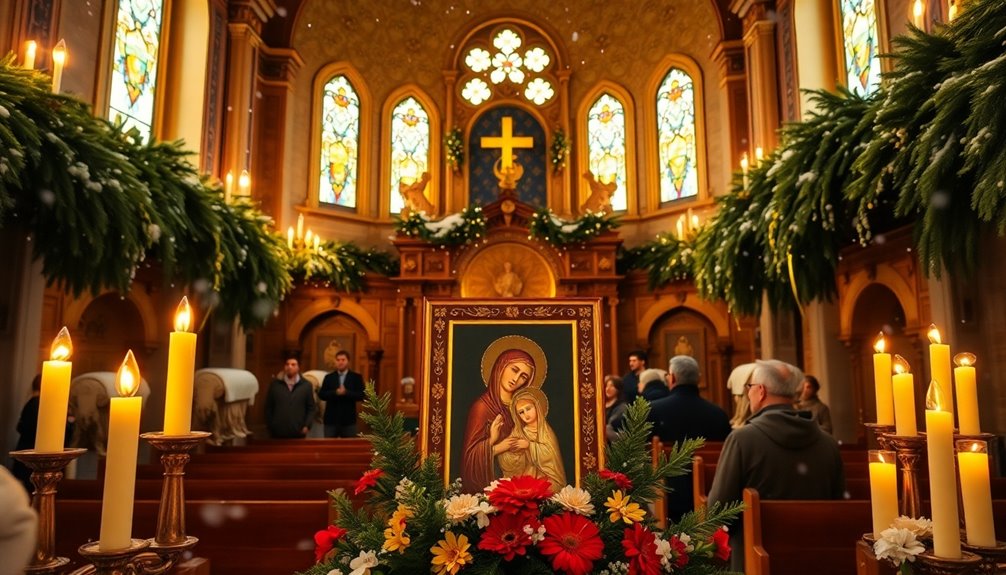Orthodox Christians celebrate Christmas on January 6 because it marks both the Nativity and the Epiphany, a tradition dating back centuries. Early Christians recognized this date for Christ's birth until the fourth century when the Roman Catholic Church shifted to December 25. The Armenian Church upheld January 6, emphasizing its ancient roots. On this day, you'll find unique traditions like the Blessing of Water, highlighting Jesus' baptism. This unified celebration reflects a commitment to Orthodox customs and showcases the church's rich cultural heritage. If you're curious about more fascinating details behind this observance, there's plenty more to explore.
Key Takeaways
- Orthodox Christians celebrate Christmas on January 6 due to the Julian calendar being 13 days behind the Gregorian calendar.
- The Armenian Church retained January 6 for Christ's birth, reflecting ancient customs and commitment to Orthodox traditions.
- January 6 combines the themes of Nativity and Epiphany, commemorating both Christ's birth and baptism.
- The Blessing of Water ceremony on this day symbolizes spiritual life and Christ's immersion by John the Baptist.
- Celebrating on January 6 highlights liturgical diversity within Christianity and enriches cultural significance for its observers.
Historical Significance of January 6
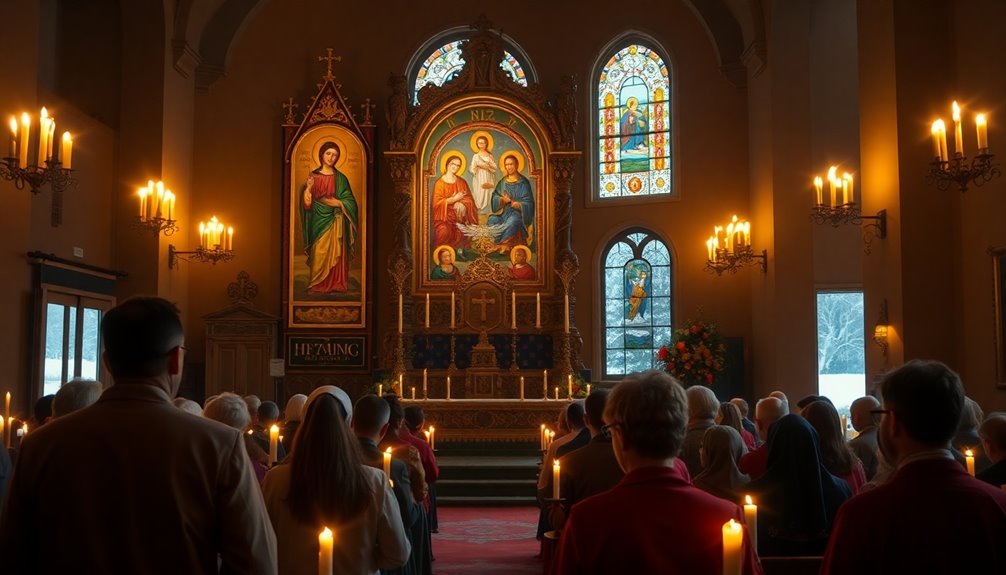
While many celebrate Christmas on December 25, January 6 holds deep historical significance, particularly within the Armenian Church. This date serves as both the Nativity and Epiphany, marking the birth and baptism of Christ.
Early Christians recognized January 6 as Christ's birth until the fourth century when the Roman Catholic Church shifted it to December, influenced by pagan traditions. The Armenian Church, however, retained January 6, emphasizing the importance of staying true to ancient customs.
This choice reflects a commitment to preserving Orthodox traditions, celebrating Theophany (Astvadz-a-haytnootyoon) for over 17 centuries. By doing so, Armenians honor the dual significance of Christ's Nativity and baptism, maintaining a unique identity in the broader Christian faith.
Armenian Christmas Traditions

As you plunge into Armenian Christmas traditions, you'll discover a rich tapestry of customs that honor both the Nativity and the Baptism of Christ. Celebrated on January 6th, this day encapsulates the theme of Theophany, intertwining spiritual reflection with community involvement.
Families gather for a special Christmas Eve meal that's meat and alcohol-free, typically featuring 12 dishes, with kutia as a staple. This meal fosters unity and highlights cultural heritage among Armenian Christians.
The January 6th observance is unique to the Armenian Church, emphasizing resilience and faith through its centuries-old traditions. While the Blessing of Water ceremony occurs later, the day itself is marked by joy, love, and a deep sense of shared belief in the significance of Christ's life.
Ceremony of Blessing of Water
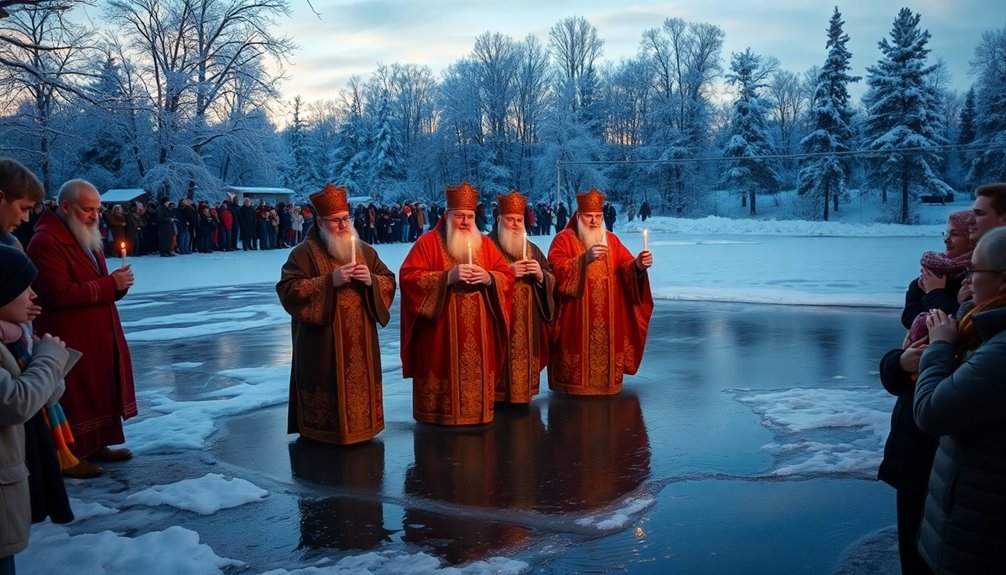
The Ceremony of Blessing of Water, or Jurorhnek, is a vital component of Armenian Christmas celebrations, commemorating Jesus Christ's baptism by John the Baptist.
On January 6, you witness this sacred event, which emphasizes spiritual life and community connection. Traditionally held at riversides, it now often takes place inside churches.
Here's what you can expect:
- A cross is dipped into blessed water, symbolizing Christ's immersion in the Jordan River.
- Holy Chrism, a mixture of olive oil and herbs, is blended with the water.
- Congregants drink the blessed water, signifying their participation in life-giving acts.
- The ceremony underscores the Holy Spirit's presence, reinforcing the Nativity of Christ's significance.
Calendar Systems and Differences
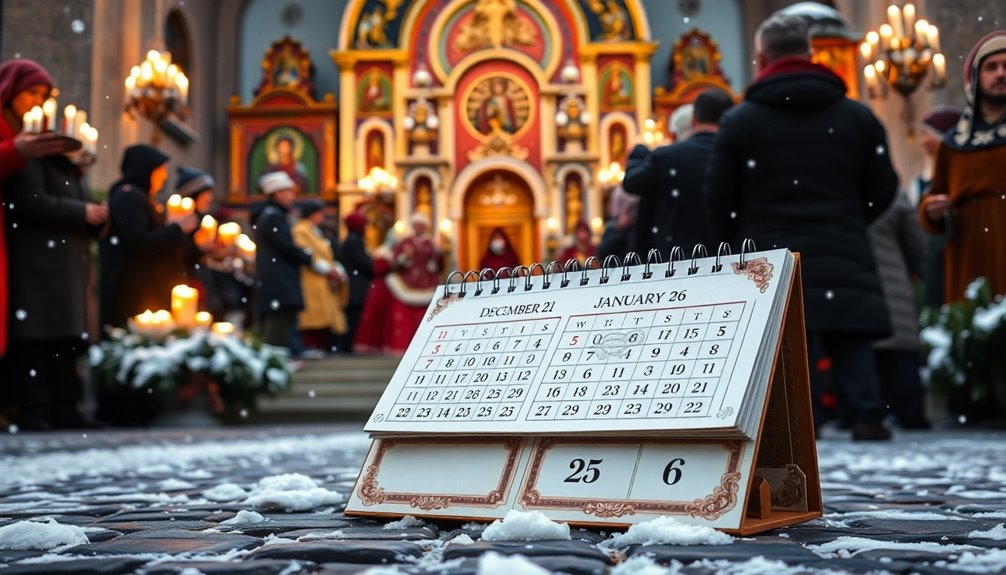
Orthodox Christians celebrate Christmas on January 6 largely because of the calendar systems in use. The Julian calendar, established by Julius Caesar, is 13 days behind the Gregorian calendar introduced by Pope Gregory XIII in 1582.
This discrepancy means that December 25 in the Gregorian calendar corresponds to January 7 in the Julian calendar, when many Orthodox Christians observe Christmas.
Despite these differences, January 6 holds significant meaning as the feast of Epiphany, commemorating both the Nativity and the Baptism of Christ.
The ongoing debate over calendar systems has led some Orthodox Churches to adopt a revised Julian calendar while others stick to the traditional one, resulting in varied celebration dates across different regions.
Cultural Significance of January Celebrations
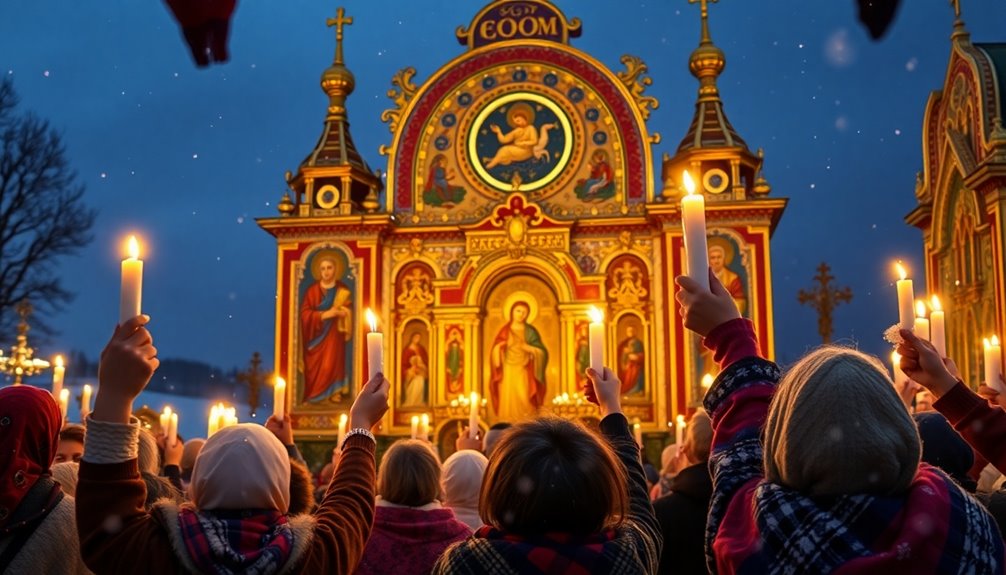
While many cultures celebrate Christmas on December 25, January 6 holds a unique cultural significance for Orthodox Christians and Armenians alike. This date is cherished for several reasons:
- It commemorates both the Nativity and Epiphany, uniting Christ's birth and baptism in one celebration.
- The Armenian Church has upheld this tradition for over 17 centuries, emphasizing cultural identity and historical continuity.
- The Blessing of Water ceremony highlights the spiritual importance of water, symbolizing life and Christ's baptism in the Jordan River.
- Celebrating on January 6 showcases the liturgical diversity within Christianity, revealing the rich tapestry of traditions among different denominations.
These elements together enrich the cultural significance of January 6 for those who observe it.
Frequently Asked Questions
Why Is Orthodox Christmas on January 6th?
Orthodox Christmas falls on January 6th because it combines the celebration of Christ's Nativity and His baptism, known as the Epiphany.
You'll find that this date has historical roots, as early Christians recognized it before the shift to December 25th by the Roman Catholic Church.
In Armenia, January 6th remained significant due to the absence of pagan traditions.
The day also features the Blessing of Water ceremony, highlighting the importance of baptism in Orthodox faith.
Was Jesus Born on January 6th?
You might wonder if Jesus was actually born on January 6th. The Gospels don't provide a specific date for His birth, so the exact day remains uncertain.
However, early Christians celebrated the Nativity on January 6th, a tradition that some still uphold today. This date emphasizes not just the birth of Jesus but also His baptism, intertwining these significant events in Christian belief.
Ultimately, the focus is more on the celebration than the specific date.
What Is the Significance of January 6th for Christmas?
January 6th holds significant meaning for you as it marks the celebration of both Christ's Nativity and Epiphany.
This day reflects the original observance of Jesus' birth, connecting you to ancient traditions that predate the Western Church's shift to December 25th.
You participate in unique rituals, like the Ceremony of Blessing of Water, which emphasizes the link between Jesus' birth and baptism, uniting Armenian Christians worldwide in shared cultural and religious heritage.
Why Don T Greeks Celebrate Christmas on January 7?
You might wonder why Greeks don't celebrate Christmas on January 7. Instead, they observe it on December 25, aligning with the Gregorian calendar adopted for civil purposes in 1923.
This date connects with the Western Christmas, reflecting traditional Christian practices rather than the Julian calendar.
For Greeks, January 6 is significant as the Feast of the Epiphany, marking Christ's baptism, rather than a celebration of His birth.
Conclusion
So, while you might think Christmas should only be celebrated on December 25, Orthodox Christians honor January 6 for deep historical and cultural reasons. By recognizing the baptism of Jesus and engaging in unique traditions like the Blessing of Water, they connect with their faith in a meaningful way. Imagine a vibrant celebration, filled with community and rituals that reflect their beliefs—this rich tapestry of history and tradition is what makes January 6 special for them.
